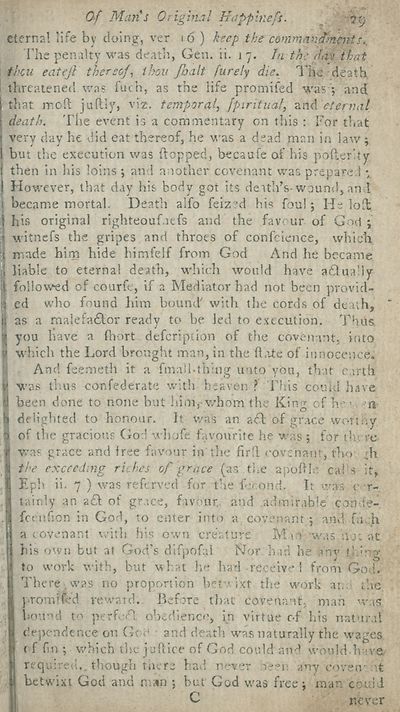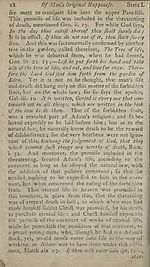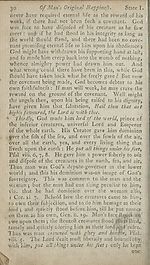Download files
Complete book:
Individual page:
Thumbnail gallery: Grid view | List view

Of Man's Original Happinefs.
eternal life by doing, ver 16 ) keep the cemmancfm<?nts.
The penalty was death, Gen. ii. j 7. In th: day that
then eatejl thereof, thou foa.lt furely die. The death
threatened was fuch, as the life promifed was ; and
that ir.oft judiy, viz. temporal, fpiritual, and eternal
death. The event is a commentary on this : For that
very day he did eat thereof, he was a dead man in law;
but the execution was ftopped, becaufe of his pofterlty
I then in his loins •, and another covenant was prepare ! y
I However, that day his body got its death’s-wound,and
i became mortal. Death alfo feized his foul; He loll
| his original righteoufntfs and the fav ur of God ;
witnefs the gripes and throes of confcience, which
! made him hide himfelf from God And he became
liable to eternal death, which would have atlua’ly
I followed of courft, if a Mediator had not been provid-
1 ed who found him bound' with the cords of dc uh,
| as a malefadlor ready to be led to execution. Thus
j|j you have a flaort defeription of the covenant, into
n which the Lord brought naan, in the flute of innocence.
Ij And feemeth it a fmail-thing unto you, that earth
|i was thus confederate with- heaven ? This could have
I been done to none but him,-whom the King of hr ’ n
I delighted to honour. It was an a<fl of grace wortny
| of the gracious God whofe favourite he was ; for tlv rc
I was grace and free favour in the firfl covenant, the ;h
the exceeding riches of grace (as the apoAF cal's it,
I Eph ii. 7 ) was referred for the ftcotad. It was c r-
I tainly an a£I of grace, favour and admirable con-te-
1 fceufion in God, to enter into a covenant ; and fa Jr
I a covenant with his own creature Man was no: at
t| his owu but at God’s difpofal Nor had he anv t.Ung-
Ito work with, but what fie had-receive 1 from God.
There , was no proportion bet" ixt the work at. tlic
promTed reward. Before that covenant, man was
bound to per feel obedience, in virtue of his natural
dependence on Gcand death w^as naturally the wages
r f fm ; which the j uflice of God could and would.have
required,, though there had never been any coven- rt
betwixt God and man ; but God was free; man could
£ never
eternal life by doing, ver 16 ) keep the cemmancfm<?nts.
The penalty was death, Gen. ii. j 7. In th: day that
then eatejl thereof, thou foa.lt furely die. The death
threatened was fuch, as the life promifed was ; and
that ir.oft judiy, viz. temporal, fpiritual, and eternal
death. The event is a commentary on this : For that
very day he did eat thereof, he was a dead man in law;
but the execution was ftopped, becaufe of his pofterlty
I then in his loins •, and another covenant was prepare ! y
I However, that day his body got its death’s-wound,and
i became mortal. Death alfo feized his foul; He loll
| his original righteoufntfs and the fav ur of God ;
witnefs the gripes and throes of confcience, which
! made him hide himfelf from God And he became
liable to eternal death, which would have atlua’ly
I followed of courft, if a Mediator had not been provid-
1 ed who found him bound' with the cords of dc uh,
| as a malefadlor ready to be led to execution. Thus
j|j you have a flaort defeription of the covenant, into
n which the Lord brought naan, in the flute of innocence.
Ij And feemeth it a fmail-thing unto you, that earth
|i was thus confederate with- heaven ? This could have
I been done to none but him,-whom the King of hr ’ n
I delighted to honour. It was an a<fl of grace wortny
| of the gracious God whofe favourite he was ; for tlv rc
I was grace and free favour in the firfl covenant, the ;h
the exceeding riches of grace (as the apoAF cal's it,
I Eph ii. 7 ) was referred for the ftcotad. It was c r-
I tainly an a£I of grace, favour and admirable con-te-
1 fceufion in God, to enter into a covenant ; and fa Jr
I a covenant with his own creature Man was no: at
t| his owu but at God’s difpofal Nor had he anv t.Ung-
Ito work with, but what fie had-receive 1 from God.
There , was no proportion bet" ixt the work at. tlic
promTed reward. Before that covenant, man was
bound to per feel obedience, in virtue of his natural
dependence on Gcand death w^as naturally the wages
r f fm ; which the j uflice of God could and would.have
required,, though there had never been any coven- rt
betwixt God and man ; but God was free; man could
£ never
Set display mode to:
![]() Universal Viewer |
Universal Viewer | ![]() Mirador |
Large image | Transcription
Mirador |
Large image | Transcription
| Antiquarian books of Scotland > Religion & morality > Human nature in its fourfold state > (33) |
|---|
| Permanent URL | https://digital.nls.uk/107541542 |
|---|
| Description | Thousands of printed books from the Antiquarian Books of Scotland collection which dates from 1641 to the 1980s. The collection consists of 14,800 books which were published in Scotland or have a Scottish connection, e.g. through the author, printer or owner. Subjects covered include sport, education, diseases, adventure, occupations, Jacobites, politics and religion. Among the 29 languages represented are English, Gaelic, Italian, French, Russian and Swedish. |
|---|

